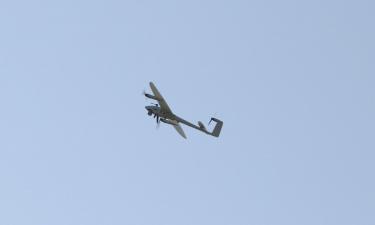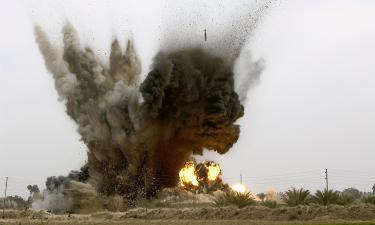Terrorist's Notes of Chechen War
Army commanders should read the recommendations; they are said to be helpful for waging the war
Army commanders should read the recommendations; they are said to be helpful for waging the war
Development of new training regulations for the Russian armed forces is underway in Russia. Recently, when I made a business trip to the republic of Chechnya, I got a very strange document. It was a letter from a mercenary fighting in Chechnya. The letter was addressed to a general of the Russian Army. Some ideas mentioned in the letter sound dubious, while the author of the letter is perfectly right in most respects. It is sad that experience of military operations is not always taken into consideration, which is why the army still suffers losses. It may happen that, while, new training regulations are not yet adopted, this letter will help army commanders to avoid more bloodshed in the future. I would like to publish this letter practically without corrections and editing.
Here is the text of the letter written by the mercenary fighting in Chechnya:
Comrade General, this is a former, so to say, terrorist writing to you. But first of all, I am a former Soviet Army senior sergeant. As I learned after the fact, my fellow soldiers had abandoned me on the battlefield just few weeks before withdrawal of the Soviet troops from Afghanistan. I had several fractures of the ribs, arms and legs. At the age of 27 I turned into a grey-haired Muslim. A Khazar man, who used to live in the USSR and spoke the Russian language a bit, gave me shelter; he restored me to health. When I could understand the Pushtoon language, I learned that the war was over, the USSR had broken up and so on.
Very soon I became a member of the man's family, but for a rather short period, unfortunately. When Nadjib (that was the name of the man who cared for me) died, the situation radically changed. First, my father-in-law didn't get back home from a trip to Pakistan. By that time we had moved from the outskirts of Kandahar to Kunduz. When I once got back home late at night, a boy living next door told me that some people had asked about me and wanted to find me. In two days, Talibs seized me as well. This is how I became a mercenary "of my own free will."
During the first war in Chechnya, such Arabs and Chechens like me were trained for a jihad in the Chechen republic. The training was held in special camps near Mazar-i-Sharif, then we were moved to the outskirts of Kandahar. There were Ukrainians, Kazakhs, Uzbeks, Jordanians and people of other nationalities among the trainees. When the training was over, NATO instructors gave the last instructions. Then we were sent to Turkey where camps for recreation and treatment of mercenaries meant for participation in the Chechen campaign were situated. I heard that highly-qualified doctors in those camps were former Soviet citizens as well.
We crossed the state frontier in railway cars; we crossed the whole territory of Georgia nonstop. We got the passports of Russian Federation citizens. In Georgia, we were treated like heroes. At that very moment, the first Chechen war ended.
But the training still continued; we started combat training meant especially for mountainous regions. Then we delivered weapons to Chechnya; the transportation was done via the territory of Azerbaijan, Dagestan, the Argun Gorge, the Pankissi Gorge and Ingushetia.
Still in Georgia, I was appointed assistant to a field commander. As the second war broke out in Chechnya, our group was first sent to a region near Gudermes and then we entered the Chechen city of Shali. The majority of the gang were locals; they were paid for each fight and went back home. So, when the Russian army was searching for Chechen terrorists, many of them were sitting at home as ordinary citizens. With money they had been paid for fighting, they bought tinned stewed meat from men serving in the rear. It would even happen that these Chechen terrorists - under the guise of ordinary citizens - managed to buy ammunition with this money; they explained they needed weapons "to protect themselves from guerrillas."
I participated in fighting, but never killed people; mostly, my job was to remove wounded and slain soldiers from the battlefield. We were pursued after one battle; in the turmoil I killed an Arab cashier and left for Shamilka early in the morning. I paid $250 to be transported to Kazakhstan, then moved to Bishkek. I said I was a refugee. When I earned some money and had gotten used to the place, I left for Alma-Ata. I knew that some of my fellow soldiers lived there and planned to find them. I even met veterans of the Afghan war and the people helped me very much.
I would like to touch upon the military tactics of both belligerent parties. Bandits know Soviet military tactics perfectly well, even those employed in the 1950s. NATO analysts studied itthoroughly, generalized the information and gave us instructions concerning the tactics already when we were trained in the camps. They openly declared that "the Russians take no account of these problems" - but they should take them into consideration, indeed.
Terrorists also know that the Russian army is not ready for fighting at night; neither officers nor soldiers are trained to wage a war at night. The army is not equipped for performance of operations at night. During the first Chechen war, up to 200-300 bandits saw how the Russian army units looked from the inside; the people know that there are no ground reconnaissance radars in the Russian army, no night vision equipment and noiseless firearms. Being perfectly aware of the inability of the Russians to fight at night, terrorists prefer to prepare and carry out their operations at night when Russian soldiers are asleep. In the daytime, Chechens risk carrying out only well-prepared sallies that are sure to be a success. Mostly, terrorists spend their daytime resting. Women and children collect information; these are people whose husbands, brothers, sons and fathers have already fallen victim to the war. Children are actively indoctrinated, after which they will even be ready for self-sacrifice and jihad.
Why are the losses of the Russian army so great in Chechnya? My advice to army commanders is that it is not correct to transport soldiers in lorries covered with awnings. It is necessary to transport soldiers in open lorries so that people can see the area of hostilities; they must face the enemy. Benches where soldiers sit must be placed in the center of the lorry, and soldiers must sit facing the boards . Arms must be held at the ready. The placement of soldiers in military lorries practiced now is rather advantageous for Chechen terrorists. They employ ambush tactics ; terrorists take up positions in two echelons. The first echelon opens fire first; the second one consists of sharpshooters. They first try to kill soldiers sitting near the boards to block the ways out so that the rest of the group can’t escape. If some still make attempts to get out from under the awning, the first echelon finishes them off. Soldiers sitting in the lorry cannot see anything because of the awning and, consequently, they cannot return fire. This is how terrorists prefer to liquidate Russian soldiers. Terrorists in the first echelon invented a technique of their own: they fire one after another; while one man is firing, another is re-loading weapons. This produces the effect of a large bandit group. Each echelon also has special soldiers who come after the fighting and remove wounded and slain from the battlefield.
As for taking hostages and captives, terrorists also have instructions of their own. The instruction says that bandits should keep an eye on "a wet chicken", which means that it is convenient to take hostages and captives in marketplaces: these crowded places make the task of taking hostages easier. That is how people were taken captive in Afghanistan.
Another recommendation of mine is that as soon as the Russian Army finishes mopping up in some area, it must immediately hold a population census in that place. It is necessary to register all the people in each house in every Chechen village. At the same time, all information obtained in the population census must be compared with official documents residing in the regional administrations. The lists of villagers must be given to police so that officers can go about the houses and verify the presence of all the people previously registered. If some people registered during the population census are not available right at the moment of the check, it means that all of them belong to an armed gang. Special control must be established over these people. Similarly, when some new people come to the place, it is also important to find out where they come from and search their houses for weapons.
My last recommendation for effective fighting with Chechen armed groups is that the Russian army shouldn't let gangs scatter. I would like to give an example here. My gang was given an order to immediately liquidate a column. However, informers had reported incorrect facts (the observer had information about the departure of the first machines, and he reported the information and left; others were probably delayed). A Russian battalion smashed the gang up and won. The wounded were then treated and came back to service a bit later. In a month all of them were ready to fight again. This is the reason why field commanders manage to remain alive for a long time.
With respect, Akhmad
And one more thing: to be a success with catching Chechen terrorist leaders, first find their wives. They may prove helpful.
Andrey Pilipchuk
Narody Kavkaza
Subscribe to Pravda.Ru Telegram channel, Facebook, RSS!





